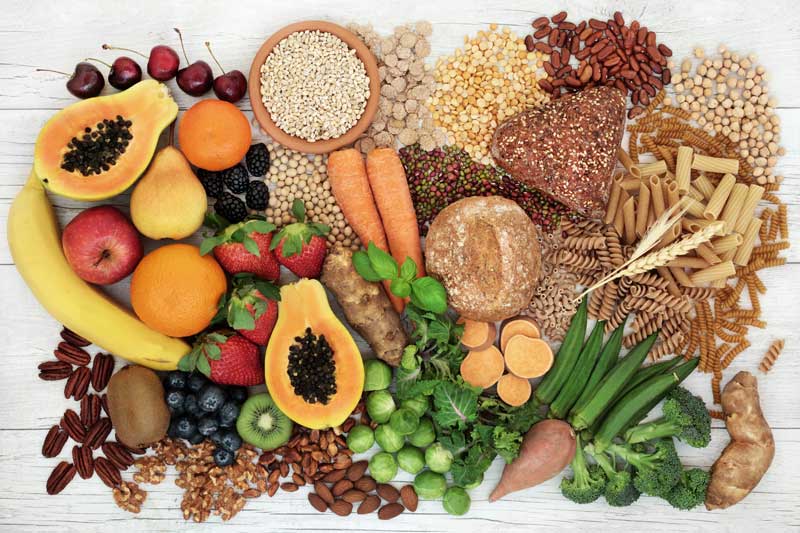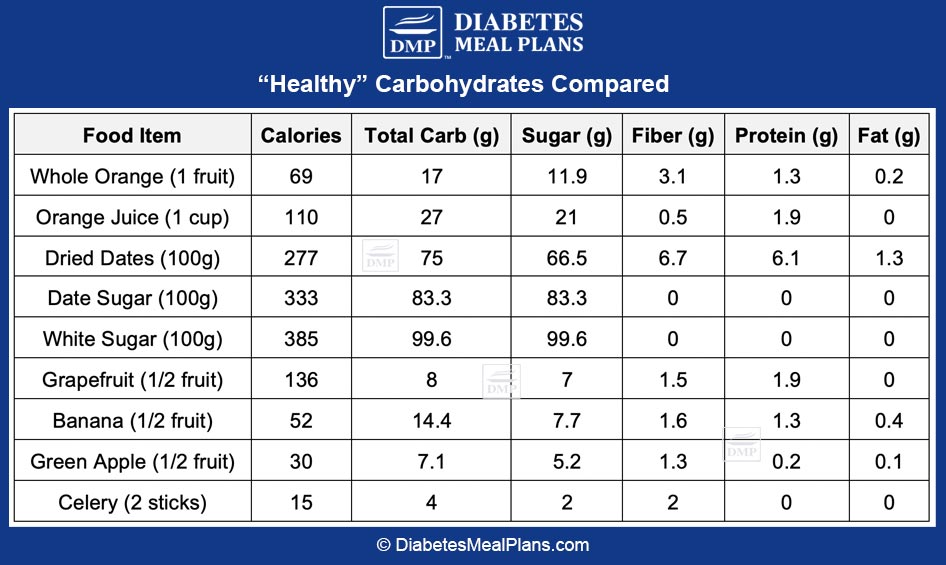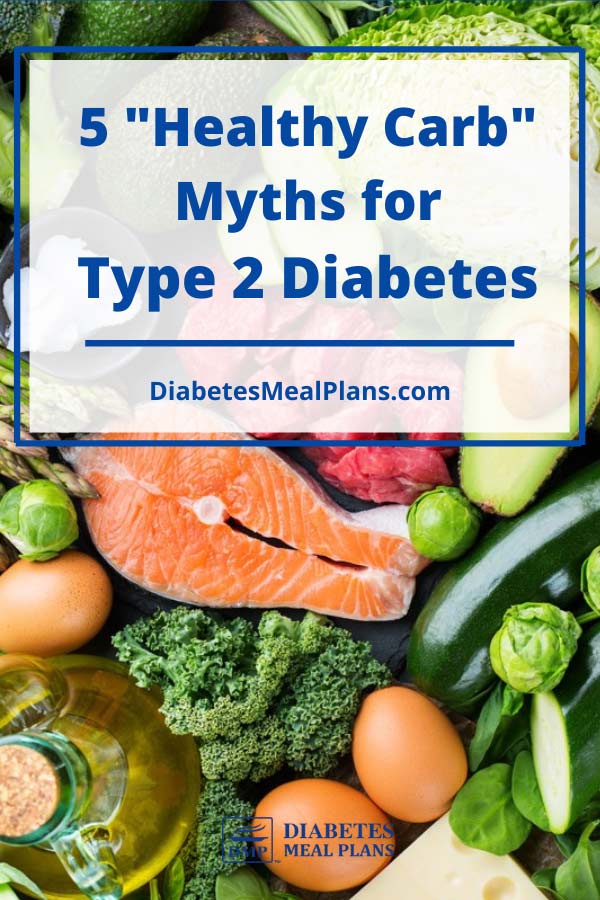Everybody seems to have a different opinion on what separates the “healthy carbs” from the “unhealthy” ones, especially in the context of type 2 diabetes. Because of this, there is a lot of confusion and many myths floating around about which kinds of carbs will and won’t have a profound effect on blood sugar levels.
Does every person with diabetes need to adhere to the exact same diet?
Are whole grains OK since they contain fiber?
Is it OK to drink orange juice because it’s full of healthy vitamin C?
These are all great questions! We’ll answer these and more down below.

Here are five pervasive myths (based off real questions from people with type 2 diabetes) and our responses…
Myth #1: “Whole grains and fruit are generally healthy foods, so they are healthy for type 2 diabetics”
TRUTH
In general, yes, whole grains and fresh fruits are considered “healthy foods” for the general population, because whole grains contain fiber and fruit can be rich in vitamins.
The big difference between someone in the general population and someone with type 2 diabetes is their ability to breakdown, process, and utilize glucose (sugar).
When you have pre-diabetes, diabetes, or metabolic syndrome, your glucose tolerance is impaired; basically, your body can no longer process sugar from food correctly or regulate your blood sugar levels properly.
Because of this, the sugary fruits and carb-heavy grains that could be considered healthy for some people are not healthy for those with diabetes. When your glucose metabolism is impaired and you eat a ripe mango or a bowl of rice, all those carbs (sugars) are absorbed into your blood stream as they should be, but then the glucose can’t get into your cells because of insulin resistance, so the glucose builds up in your bloodstream.
Over time, this build-up of glucose can result in a high A1c, systemic inflammation, and other chronic health problems.
Just because something may be healthy for the general population that doesn’t mean it is healthy for every subgroup within that population. You need to eat to treat your condition.
Myth #2: “It’s OK to eat high carb foods as long as they also contain fiber”
TRUTH
If you want to improve your overall health, make friends with dietary fiber. From nuts and seeds to green vegetables and fresh berries, high-fiber foods are almost universally a great option.
Yes, fiber can improve your digestion, improve your blood sugar regulation, and even support healthy weight loss, but there is a catch…
Some people with diabetes justify eating higher carb foods like brown rice, oats, beans, or certain sugary fruits by stating that these foods contain fiber, which they believe offsets the negative impact of the carbohydrates.
Now there is some truth to this; dietary fiber does play a role in slowing down the absorption of glucose into your blood stream, thereby protecting you from a sudden blood sugar spike. However, the presence of fiber does not magically transform a bowl of oatmeal topped with dates and banana slices into a blood sugar friendly meal.
While adding fiber to your meal certainly can slow the absorption of sugar, it does not reduce the total amount of sugar (carbs) in that meal. A bowl of oatmeal that contains 27g of carbs and 4g of fiber, for example, may still cause a significant rise in your blood sugar levels.

Myth #3: “Only processed & junk food carbohydrates cause high blood sugar”
TRUTH
There are some scenarios where “good” can be the enemy of “great.”
Yes, while it is better to choose a whole food that contains a lot of carbs (like a fresh orange), over processed carbs (like a glass of orange juice), there is still a third better option; the best option is to choose something unprocessed that is also low in carbs.
This is because high carb foods, regardless of how they’re processed, are still going to cause a rise in blood sugar levels. Your body doesn’t care if 20g of sugar are coming from a fresh slice of fruit or a slice of chocolate cake…all your body knows is that your blood sugar levels are going up, fast!
If you glance at the nutrition chart above, you’ll see the carb/sugar content of a whole orange and that of a glass of orange juice. A cup of orange juice contains about 28g of carbs while the whole orange contains only 17g of carbs plus 3g of fiber.
It’s easy to see that the whole orange is a better choice than the juice because it contains more fiber and less straight sugar, so you may be tempted to choose the whole orange.
Another area of confusion is sweeteners.
While opting for a more “natural” sweetener such as dates or date sugar in place of heavily processed white sugar (sucrose) may seem like the better choice, these “healthier” sugars don’t fare much better than white sugar.
As you can see on the nutrition chart, just 4 whole dates (100g) total a whopping 66g of sugar! Compare that to half a cup of organic date sugar (83g of sugar) and standard white sugar (99g of sugar). You can quickly see that none of these sweeteners are the way to go, regardless of how processed or natural they are.
To keep your blood sugar stable, say goodbye to traditional sweeteners and opt for low or no-carb sweeteners like stevia, erythritol, and monk fruit.
Simple swaps that trade high carb foods for lower carb alternatives are a great place to start your low carb journey!
Myth 4#: “It’s better to eat high-carb than high-fat, because dietary fat causes heart disease!”
The myth that eating dietary fat directly causes heart disease is so ingrained in our collective minds that it can be difficult to accept any other way of thinking. But regardless of what you’ve heard over the years, research confirms that low carb diets can provide better outcomes than low fat diets when it comes to treating type 2 diabetes.
When you have diabetes, your body does not process glucose correctly so if you bombard your body with sugar in any form (soda, candy, high carb grains, etc.) you can develop systemic inflammation, which can negatively impacts cardiovascular health.
On the other hand, low-carb high-healthy-fat diets such as the Mediterranean diet have been shown to have a positive affect on both blood sugar regulation and cardiovascular markers in those with diabetes.
Studies have found that overall a low-carb, high-healthy-fat diets appear to improve overall cardiovascular disease factors – lowering triglycerides, increasing HDL “good” cholesterol, lower blood pressure, and lowering blood sugar levels, which reduces the inflammation and damage throughout your arteries.

Myth #5: “High carb foods don’t bother me, so they are safe for everyone”
TRUTH
As we covered in our first myth on this list, what is healthy for the general population is not always healthy for those with chronic conditions like diabetes.
This notion can be true even among different people with type 2 diabetes. While we encourage a lower carb, whole food diet for all people with diabetes, each person has their own level of tolerance when it comes to moderate-carbohydrate foods.
While Jane may be able to snack on half a banana with peanut butter and suffer no obvious effects, John may still get elevated blood sugar from eating even a half a banana.
If half a banana contains too much sugar for you (which is likely), then try switching to a few slices of a sour green apple. Even better, skip the apple altogether and enjoy your peanut butter spread over a few crunchy celery sticks!
The big takeaway point is that every single body is unique and each person reacts differently to different foods, so just because one person can tolerate a fruit smoothie for breakfast that doesn’t mean that everyone can.
More importantly, “healthy carbs” for the general population that prevent health issues are different to the best carbs to eat to treat a health condition you already have. Prevention and treatment are two different things!
Eat to treat your type 2 diabetes or prediabetes, and you will see many aspects of your health improve overall.

Bernadine Dunstan
Good day
Is it bad for me to have 2 slices of brown whole wheat bread a day for lunch or what other kind of bread can I eat
or I am hungry all day besides my fruit
is Oates good for me
Kind regards
Bernadine
Emily - Dietitian (MS, RD)
All the foods you are inquiring about – bread, fruit, oats- are quite high in carbohydrate. Carbohydrates are the #1 food that effect your sugar levels so for that reason we encourage people to limit carbohydrates to 80-130mg/Dl. You can find some better bread and fruit suggestions in both of our articles we have written on our blog.
Collin B
Weird from the beginning statement… it said “True” but then it went on to conclude the opening statement wasn’t true.
In fact, all of the “myths” being explored claimed to be true, except the 4th which didn’t say one way or another at the outset like the rest did.
Even the last one was labeled “true” when it’s clear that something that works for one person may not work for everyone.
I feel like this didn’t get the editing it needed, but some of the information was useful.
Emily - Dietitian (MS, RD)
Thank you for your feedback on the formatting. Every person is different, and a big take away is that all nutrition claims really need to be analyzed based on your individual situation. It’s never a one size fits all!
Rita
I read it the same way you did at first, but I don’t think they were saying the myths were true. I think they meant this is the myth and following is the truth.
Carol
So are you telling me fava beans chick peas , lentils, barley etc aren’t good for diabetes 2 sufferers??
I’m more confused than ever!!!
Emily - Dietitian (MS, RD)
While these types of foods contain lots of nutrients, vitamins and fiber – they also contain a hefty amount of carbs. Being that carbs are the #1 nutrient that impact your blood sugar, we do recommend you eliminate or minimize these types of foods for best blood sugar control. If they are something you’d like to continue consuming, I would recommend checking your blood sugar 2 hours after consuming. IF your blood sugar is above 140mg/Dl, then you should consider reducing the portion size a bit next time to help minimize blood sugar rise.
Najumudeen
100 percent true ….experience
Peggy Bly
The more I read the more confused I get. My doctor only said to follow a low carb diet and exercise and loose weight to control my type 2 diabetes,no mention of keeping track of glucose levels and no mediation to take(thank goodness). I was pre Diabetic then type 2 then back to prediabetic!!!!So this is very confusing,saw a dietician but didn’t amount to anything!!!!What to do?????!!!
Emily - Dietitian (MS, RD)
Once you receive a diabetes diagnosis, you are always going to have that diagnosis. However you can always strive to improve your glucose control to bring your numbers into a pre-diabetic (or even non-diabetic) range – this is doable for a lot of people who have followed along with our low carb meal plans. Your doctor gave you some great starting advice – diet, exercise and weight loss when appropriate. If you’re open to it, you can purchase a blood sugar meter (glucometer) at a pharmacy to start tracking along how your diet, exercise and lifestyle changes are impacting your numbers. If you do start tracking, then your goal is under 100mg/Dl upon rising (fasting sugar) and under 140mg/Dl after meals (post-prandial). Keep digging through the information on our blog and let us know if you have any questions.
Mm
Confused
Emily - Dietitian (MS, RD)
We are always happy to answer any specific questions you have. We also have a great search feature on our website if you are looking for a particular topic (ie. supplements, bananas, recipes.)
Kierra
Great read, confirmed my belief that a diabetic diet isn’t one size fit all and some food isn’t necessarily unhealthy but it is unhealthy for some people. I personally stay away from grains, potatoes, pasta, etc but I do have an orange every now and then and by the grace of God, it doesn’t cause a major rise in my blood sugar levels. It’s best to remember that you know your body better than anyone, and it’s also best to work with it, not against it.
Emily - Dietitian (MS, RD)
All very true. It’s the consistent small choices that lead to change in the big picture (ie. our blood sugar levels and health.) Sounds like you’re on the right track!
Kevin Girts
This article was not as well written as almost all your others. I drew no clear conclusions as to what is truth and what is myth.
MaryAnne
A well balanced article. So many persons writing on this topic almost shame a person if you don’t follow their interpretation of how your body works.
Emily - Dietitian (MS, RD)
Thank you for your kind feedback!
Jon Otte
Very good information for diabetics.